 The music that we sing in worship is by its usage necessarily theological. Whether it is good, bad, or seemingly indifferent, it is theological in the sense that it is being used in the context of our worship of God. The music of worship talks about God and our relationship to Him. Seems that’s the point, right?
The music that we sing in worship is by its usage necessarily theological. Whether it is good, bad, or seemingly indifferent, it is theological in the sense that it is being used in the context of our worship of God. The music of worship talks about God and our relationship to Him. Seems that’s the point, right?
The load of the effective worship music leader is heavy indeed. It would be easy in our entertainment driven culture to get sidetracked on lesser things, but I was recently reminded again of one of the most critical. One of the weightiest responsibilities in churches where the worship musician selects the songs is the responsibility to play theological filter in the selection process. There is, of course, the duty to refrain from programming obvious theological error. Even when the musician is unsure, wisdom dictates checking with the pastor or a Bible scholar for assurance. What’s more, we must realize that as words are placed on the lips of worshipers, engagement with God is being framed through the songs. In the best worship songs the truth of the Gospel is being heralded with clarity and power. A well-known pastor recently told me that his test for good worship music is whether or not the music makes Jesus known. He stated that if he were to drop dead before he preached the sermon in a service, he wanted to know that people would have heard the Gospel. I must admit his words have given me pause in my own planning to ask that question. Does the music make clear the Savior and His intention for our lives?
Whether we sing about God and His characteristics, or if we sing to Him expressing our gratitude and love, or if we are admonishing one another to love and good deeds, let us be certain that Christ is made known! I would challenge you to consider this filter in your own planning and evaluation of worship material. Remember, singing both reflects what we live and believe, and also forms those present. As Nathan Corbitt says, “it is two sides of the same coin. On one side the coin reflects what Christians believe. On the other side it reinforces and teaches the same concepts about God.” (Nathan Corbitt, The Sound of the Harvest) Is what we are singing declaring Who Jesus is and what He desires for us? If we live by these words will we be shaped to become more like Jesus and reflect His light?
Finally, let me remind us to practice what we preach. In this instance I not only mean that we live out what we say we believe, but also encourage strongly that worship music leaders seek ways to frequently remind the church how critical it is to convey the Gospel in expressive means that display lives that have been transformed by that Gospel. Give your congregation a better opportunity to mean their worship singing by familiarizing them with any new song, and by reinforcing the melody of those songs that are already in their repertoire. Our faith is on display as we confess in our singing, as we proclaim through our singing, and as we commit through our singing and testify to life in Christ:
No guilt in life, no fear in death;
This is the power of Christ in me.



